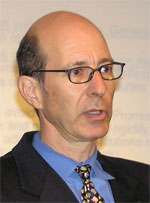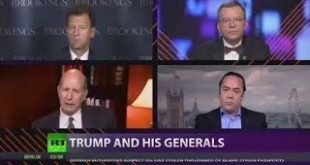Thomas Carothers has recently written an article in Foreign Affairs, the prestigious elite journal published by the US based Council on Foreign Relations. The article asks is the US hypocritical for criticizing Russian election medlling? Given the place of publication, the unsurprising conclusion is it is not. The problem is the US is a champion [...]
Read More »Re-theorizing the Welfare State and the Political Economy of Neoliberalism’s War Against It
This paper argues neoliberalism is engaged in a war against the welfare state. At issue are competing views regarding the size of the welfare state and how it should be organized. In waging this war, neoliberalism seeks to politically discredit the traditional welfare state and change the economic structure so that the latter becomes unviable. [...]
Read More »Thomas Palley
'''Thomas Palley''' ( born March 17, 1956 ) is an American economist who has served as the chief economist for the US–China Economic and Security Review Commission. He is currently Schwartz Economic Growth Fellow at the New America Foundation. All text, either derivative works from Wikipedia Articles or original content shared here, is licensed under: Creative Commons Attribution-ShareAlike 3.0 Unported License A full list of the authors of the original content can be found...
Read More »Thomas Palley
'''Thomas Palley''' ( born March 17, 1956 ) is an American economist who has served as the chief economist for the US–China Economic and Security Review Commission. He is currently Schwartz Economic Growth Fellow at the New America Foundation. All text, either derivative works from Wikipedia Articles or original content shared here, is licensed under: Creative Commons Attribution-ShareAlike 3.0 Unported License A full list of the authors of the original content can be found in...
Read More »The General Theory at 80: Reflections on the History and Enduring Relevance of Keynes’ Economics
This paper reflects on the history and enduring relevance of Keynes’ economics. Keynes unleashed a devastating critique of classical macroeconomics and introduced a new replacement schema that defines macroeconomics. The success of the Keynesian revolution triggered a counter-revolution that restored the classical tradition and now enforces a renewed classical monopoly. That monopoly has provided the [...]
Read More »CrossTalk: Trump and His Generals
Candidate Donald Trump ran on a campaign that not only questioned many foreign policy orthodoxies, but also lashed out against the neoconservative view of the world. Today the president is surrounded by men in uniform. Some are calling this a soft coup. CrossTalking with Michael O'Hanlon, Thomas Palley, and Patrick Henningsen. FACEBOOK: Like CrossTalk on Facebook https://www.facebook.com/crosstalkrules/ SOUNDCLOUD: Listen to CrossTalk+ here https://soundcloud.com/rttv/sets/crosstalk_plus...
Read More »A Theory of Economic Policy Lock-in and Lock-out via Hysteresis: Rethinking Economists’ Approach to Economic Policy
This paper uses hysteresis to develop the concept of policy lock-in and lock-out. Policy changes may near-irrevocably change the economy’s structure, thereby changing the distribution of wealth, income and power. That may lock-in policy by changing the political equilibrium. Exit costs that block policy reversals also cause lock-in. Conventional thinking treats policy as a dial [...]
Read More »Trump and the Neocons: Doing the Unilateralist Waltz
The neocon factor dramatically changes the interpretation of the Trump administration’s unilateralist international economic policy chatter. Donald Trump’s first one hundred days have revealed his inclination for unilateralism in international relations. That inclination reflects his opportunistic and bullying disposition, and it also fits well with his anti-globalization pose. Trump’s unilateralism has also spawned a dangerous waltz with [...]
Read More »The Real Reasons for Trump’s Anti-Globalization Circus
Trumponomics: How Trump skillfully used anti-globalization as bait to cover up his extremely neoliberal switch. A key element of Trump’s political success has been his masquerade of being pro-worker, which includes posturing as being anti-globalization. However, his true economic interests are the exact opposite. That creates conflict between Trump’s political and economic interests. For political leaders [...]
Read More »Monetary Policy and the Punch Bowl: The Case for Quantitative Policy and Wage Growth Targeting
Federal Reserve Chairman William McChesney Martin famously declared that the Federal Reserve “is in the position of the chaperone who has ordered the punch bowl removed just when the party was really warming up.” This paper uses the punch bowl metaphor to analyze how the Federal Reserve can improve monetary policy so as to deliver [...]
Read More » Thomas Palley: Economics for Democratic and Open Societies
Thomas Palley: Economics for Democratic and Open Societies



